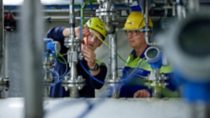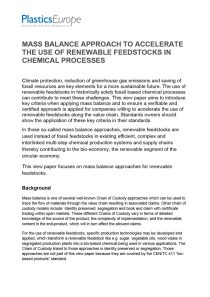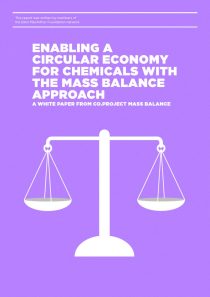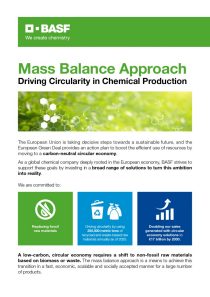The Mass Balance Approach in Feedstock Substitution
In its transition towards a circular economy, BASF is increasingly using recycled or renewable raw materials as alternatives to fossil resources at the beginning of its value chain. The alternative feedstocks are attributed to downstream products via the mass balance approach. While mass-balanced products keep all product properties unchanged compared to their conventional equivalents, they contribute to the substitution of fossil resources in BASF´s production process and may have a smaller product carbon footprint than their conventional equivalent.

An established method to foster sustainability in existing infrastructure
Let's start with the following scenario: A customer wants her product, for example cocoa or wood, to have a lower carbon footprint. She is looking for more sustainable alternatives to the conventional product. Due to the complex, networked processing and infrastructure, it is not economical to set up a separate value chain for the sustainable alternative.
The solution: The mass balance approach ensures that the proportion of sustainably grown cocoa or wood that is brought into this value chain is attributed to the customer products. Even if they do not physically contain the sustainable material, the certification is proof of the corresponding sustainability contribution in the value chain.
The mass balance approach defines the rules for attributing the proportion of sustainable raw materials to the end product. In the initial phase of the transition, it offers the opportunity to differentiate more sustainable products on the market and return the higher costs of alternative processes and materials using the existing infrastructure. What matters is that someone introduces a more sustainable alternative to the existing business.
If customers decide to buy a product that offers a sustainability benefit while maintaining high quality, they can contribute to a higher proportion of alternative feedstock. In the absence of quotas or regulations, the main driver of the transformation to renewable raw materials is the market.
Benefits of the Mass Balance Approach
- The volume of alternative feedstock in BASF´s production increases in line with demand
- The use of alternative raw materials in the BASF value chain reduces the carbon footprint of products and the need for fossil raw materials for mass-balanced products
- Quality, performance and properties of our products remain the same compared to the conventional twin
- Mass-balanced products can be processed like conventionally produced materials

Two alternatives to fossil feedstock:
Biomass balance and ChemCycling®
The chemical industry is undergoing a raw material transformation. While a major part of chemical production is still based on fossil raw materials, BASF is taking steps to become less dependent on fossil resources. The aim: to use more renewable and recycled raw materials in existing production plants.
BASF's biomass balance and ChemCycling® approach were born out of a simple question: How can we replace fossil raw materials for thousands of products manufactured in BASF's vast, complex production network? The solution is to feed alternative raw materials into the production chain alongside fossil raw materials at such an early stage that the end products remain chemically unchanged. Products that are certified as biomass-balanced or Ccycled® thus offer the same performance and quality as conventional products, with the added benefit of a lower carbon footprint and a contribution to waste recycling.
A pragmatic approach: Mass balance supports the feedstock transformation
Two steamcrackers, the synthesis gas plant and the acrylic acid plants are core elements of the Verbund. In the steam cracker, steam is used to split or “crack” naphtha, a long-chain hydrocarbon, into smaller molecules. These molecules then serve as the building blocks for downstream production. They include, for example, hydrogen, methane, ethylene and propylene, which are mainly processed into plastics, coatings, solvents and crop protection products.
The plants are the beginning of countless value chains, and their products are further processed into thousands of commercial products through further process steps. That’s why setting up a dedicated production system for relatively small amounts of recycled or renewable feedstock would leave a huge environmental and economic footprint and cause additional CO2 emissions.

Mass balance offers a solution for the early phase of the transition: We can introduce different alternative materials such as biogas, bio-naphtha, or pyrolysis oil in technically viable feed-in points of our integrated chemical production. In order to use all possible feedstocks as efficiently as possible, a mass balance model with flexible feedstock selection is required.
Interlinked production facilities and highly optimized processes ensure that all materials are used in the most efficient way. What's more, we can scale the quantities of alternative raw materials in line with increasing customer demand for mass-balanced products, thereby accelerating the transformation.
Mass balance for a more sustainable value chain
Mass balanced products can be processed by our customers in various industries in the same way as their conventional twin. Our mass balance portfolio includes more than 1.500 certified products. Their advantage lies in the combination of proven ecological benefits with unchanged product properties.
How mass balanced products deliver environmental impact:
The mass balance model is recognized in the international standard ISO 22095:2020 which lays down the rules for attributing sustainable input to final products. BASF’s mass-balanced products fulfill the requirements of third-party certification schemes, REDcert2 and ISCC PLUS. They certify the correct substitution of fossil resources through recycled or bio-based feedstock. Thus, the certification confirms the sustainability impact of the alternative feedstock usage even if the alternative input cannot be detected in a specific output product of the integrated production system.
BASF biomass balanced products and Ccycled® products offer the same chemical properties as their conventional equivalents. In addition, they contribute to saving conventional resources in BASF’s production value chain and may offer a reduced product carbon footprint. The product carbon footprint is calculated according to the Together for Sustainability (TfS) guideline.
To enable a fast integration of different circular feedstocks at different feed-in points of the complex production system, the mass balance attribution method is the chain of custody model that fits best. The more flexible the attribution method, the more flexible the choice of new feedstocks and feed-in points, the more customer industries can participate in the transition which leads away from fossil feedstock. This flexibility encompasses not only chemically recycled or biobased feedstock, but also other circular feedstocks for which new investments are necessary
Mass balance standards are evolving
Independent bodies audit the attribution (i.e., how the volumes of the sustainable raw material are mathematically assigned to the final product). However, at the moment, experts are still using different methods – also known as standards – for auditing and certification.

We engage in collaborating in different stakeholder platforms:
- Associations, e.g. Joint Task Force on mass balance at European Chemical Industry Council (CEFIC) and PlasticsEurope
- Certification schemes: Active participant/member in leading scheme givers like ISCC (International Sustainability & Carbon Certification), REDcert, and RSB (Roundtable on Sustainable Biomaterials)
- Member of different public private partnership initiatives, e.g. Circular Plastics Alliance initiated by the EU Commission, Green Deal initiated by the Dutch government
- Norming: Member of different working groups like ISO TC 308 (chain of custody), ISO TC 323 (circular economy), ISO TC 207 (environmental management), ISO TC 61 (plastics)





